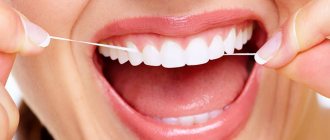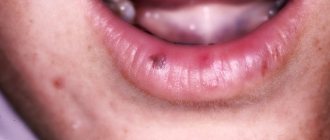Poor diet is a common cause of halitosis
Sometimes parents associate the occurrence of bad breath with the fact that the baby may have eaten something too odorous or stale.
Indeed, some foods can leave a not entirely pleasant smell for a long time - garlic, radishes or radishes, onions, cabbage, corn. Drinking certain juices and carbonated drinks also contributes to this. But the smell should not be very persistent - ventilation of the organs and natural cleansing of the oral cavity should quickly cope with it.
Often such a sign can occur after an excessive feast, when the baby at the festive table simply ate too much. The digestive system, in its normal mode, cannot process excess food, so it stagnates in the stomach - this is where unpleasant belching with a putrid unpleasant odor occurs. This also happens in children who are prone to overeating and obesity - for them this symptom can often be chronic. If the diet shifts towards protein foods, this stimulates constant rotting processes.
Correct introduction of the first complementary foods during breastfeeding will help avoid the appearance of excess weight in children. Very often this problem occurs among sweet lovers. Waste products released by colonies of microorganisms can cause an unpleasant odor.
Causes of halitosis in children
The appearance of halitosis in children of any age can be caused by a variety of reasons, ranging from insufficient oral hygiene to the presence of a foreign body in the nose. It is important to correctly diagnose, determine the true cause of osostomy and, if possible, eliminate it.
Lack of moisture in the body
Causes increased viscosity of saliva, poor digestion, which can cause bad breath. An infant newborn receives the main liquid from mother's milk; in hot weather it is necessary to give boiled water to drink. A 4-5 year old child should drink approximately 1.5 liters of liquid per day, not limited to juices and teas. It is important to give your toddler drinking water, which helps improve digestion.
Poor oral hygiene
With the appearance of the first tooth, the baby should be accustomed to oral hygiene procedures. Children under two or three years old should have their teeth brushed by one of their parents. From the age of three, children should be taught to brush their teeth correctly on their own. Improper and insufficient cleaning of plaque contributes to the appearance of halitosis, which resolves after thorough brushing of the teeth.
Poor nutrition
If a child systematically overeats, eats fatty fried foods generously seasoned with onions and garlic, a heavy odor from the mouth will haunt him constantly. It is important to adjust the baby’s nutritional system according to his age needs, observing the drinking regime.
Stressful situation
Strong emotional shock, stress, and vivid emotions are a real test for a newborn. They cause dry mouth, which contributes to halitosis. In a stressful situation, you need to give the child a drink of water or sour juice, suck a slice of tangerine or lemon; such simple steps promote active salivation and make the child’s breathing clean and easy.
Unpleasant smell in the morning
Babies may experience bad breath after sleep. It is caused by the fact that saliva is not released at night during sleep, bacteria multiply, causing halitosis. It is enough to brush your teeth with a brush and toothpaste - and the unpleasant phenomenon disappears on its own.
Chronic nasal congestion
If your baby's mouth smells like snot, you need to pay attention to the condition of the mucous membrane of the nose. With chronic rhinitis, nasal breathing is difficult, and dry crusts form in the nasal passages. It is necessary to moisturize the surface of the mucous membrane, monitor humidity, ventilate the room well and carry out wet cleaning.
Presence of a foreign body in the nasal passages
A strong putrid odor accompanied by thick yellow discharge from the nasal passages should alert you. These symptoms are characteristic of a foreign object entering the nasal passages - beads, buttons, a piece of fruit. You should consult a doctor or emergency room as soon as possible to remove the foreign body. Otherwise, serious complications are possible, including suffocation.
Diseases of teeth and gums
Caries, stomatitis, gingivitis and other dental diseases can cause bad breath. A careful examination will reveal a carious lesion in the baby’s mouth. Even if there is no visible damage to the tooth enamel, it is necessary to consult a dentist to rule out the presence of oral diseases.
Upper respiratory tract diseases
Sore throat, tonsillitis, adenoiditis, bronchitis provoke the occurrence of halitosis in children. The pus that accumulates on the surface of the tonsils, in the lacunae, on the back wall of the throat has an unpleasant smell. The cause of the disease should be treated, rinse with an antiseptic solution, and in difficult cases, antibiotic therapy is necessary.
Diseases of the gastrointestinal tract
When a little person’s mouth smells like solvent, sour milk, vinegar, and there is an upset stomach and diarrhea, this indicates problems with the gastrointestinal tract. Consult a gastroenterologist; sometimes it is enough to adjust the baby’s diet, and the problem disappears without a trace. In more complex cases, special treatment is indicated.
Teething odor
When a baby is teething, temporary halitosis may occur, caused by inflammation of the gums and the proliferation of pathogenic bacteria. The baby's gums are red, painful and swollen. The dentist will recommend special medications that reduce the baby’s discomfort during teething.
The key to fresh breath is hygiene
It is imperative to pay attention to the condition of the oral cavity. Maybe the child is too lazy to brush his teeth, or he does it just for show, without thoroughly cleaning the gums and interdental space. Therefore, in this case, it is possible that the baby has developed and is developing caries, and the appearance of the smell is connected precisely with this.
You need to take care of your oral cavity as soon as your baby gets his first teeth. Colonies of pathogenic microorganisms develop well in a poorly cleaned oral cavity.
Take a good look at the condition of the oral mucosa - mothers are sometimes able to detect signs of stomatitis or other inflammations.
There can be a lot of food debris left on the mucous membrane of the tongue and parents should not forget about this. Very young children need to regularly clean their tongues of plaque; as they grow older, you need to teach them to do this on their own.
To prevent halitosis you can:
- Give your child enough fluids to drink;
- Limit the consumption of sweets, flour and confectionery products, this will reduce the activity of the formation of soft and sticky plaque;
- Brush your teeth thoroughly (remember that until the age of 8-9 years, a child cannot yet properly brush his teeth on his own, and he needs help);
- Teach your teenager to use dental floss, mouthwash, and if he has braces, then an irrigator.
make an appointment with a pediatric dentist online or by phone: +7
If there is insufficient salivation, consult a doctor
In some cases, bad breath may be associated with the use of certain medications.
The oral cavity in children should not be dry. Due to its composition, saliva is destructive for microorganisms; it takes part in the self-cleaning of the oral cavity, simply washing away all food debris.
In case of insufficient salivation, parents should definitely consult a doctor for advice. Perhaps this condition was caused by taking certain medications. The periods after illnesses during which the baby took antibiotics for a long time are very dangerous.
Be sure to check the normal secretion of the salivary glands.
Specific pungent odor
Parents should be alarmed by the specific smell from the baby’s mouth, which does not go away after hygiene procedures. Limit your baby's consumption of sweets and heavy protein foods, and ensure he drinks plenty of fluids. Usually, after these events, children's halitosis goes away.
Below we will tell you which smells should cause an instant reaction from parents.
«
Acetone (acetic, solvent)
The smell of acetone or a chemical solvent emanating from a baby, especially against a background of elevated temperature, should cause maximum concern for parents. It appears in acetonemic syndrome, a dangerous condition that is quite common in children of all ages. If you suspect its occurrence, you must immediately call an ambulance, before the doctors arrive, and give the baby boiled water often and in small quantities (a teaspoon).
A slight acetone smell can be a sign of kidney disease, malfunction of the pancreas, helminthiasis (worms), dysbacteriosis, and diabetes. In any case, it is advisable to consult a doctor immediately.
Putrefactive
Appears with insufficient oral hygiene, the occurrence of ENT diseases (sore throat, pharyngitis, tonsillitis, in parallel, the child has a white tongue, a stuffy nose, a cough), stomatitis, caries, low acidity of the stomach (the baby often has a stomach ache), the presence of diseases of the esophagus . You should consult a dentist, ENT specialist, gastroenterologist, systematically brush your teeth with a children's toothbrush and toothpaste, and ensure drinking regime.
Purulent
A pungent purulent odor accompanies chronic inflammation and proliferation of lymphoid tissue in the baby’s nasopharynx. The tonsils become covered with purulent plaque, plugs form, emitting an unpleasant odor. The child has a high fever, a sore throat, a runny nose, and a coated tongue. Contact your pediatrician; antibiotic treatment may be necessary. After recovery, your breath will become fresh again.
Another reason for bad breath against the background of copious discharge of dense yellowish snot can be the presence of some object in the baby’s nostril. Contact your ENT specialist to examine your baby's nose.
Sourish
If your baby has a sour breath, this may indicate increased acidity and an inflammatory process in the stomach. It is necessary to contact a gastroenterologist and check the baby for the presence of gastritis. The second cause of bad breath is reflux, or the entry of gastric juice into the baby’s esophagus. In this case, the patient suffers from heartburn and pain in the hypochondrium.
Sweetish
Does the baby have a cloying sweet aroma from the mouth? There is reason to suspect liver problems. It is important to promptly visit a gastroenterologist - the symptom occurs with hepatitis or cirrhosis of the liver.
Chemical
If your toddler smells of chemicals, it is advisable to check the condition of the digestive organs, especially the gallbladder; this symptom is characteristic of biliary dyskinesia.
Chlorine
The specific smell of chlorine mixed with metallic notes appears with increased bleeding gums and periodontal disease. Contact your dentist and check the condition of your baby's teeth and gums.
Yoda
The appearance of the smell of iodine is a reason to urgently contact an endocrinologist, as it may indicate an excess of iodine that accumulates in the baby’s body. This condition can occur after a long stay at sea, after taking iodine preparations, or in the presence of thyroid pathology. In infants, an iodine tint appears when infected with Klebsiella, a bacterium that enters the child's body with unwashed fruit and affects the stomach and intestines.
Bile
If a newborn's breath smells like bile, this may indicate poor bile flow. Consult a doctor, do an ultrasound of the abdominal organs, and take general tests.
Gland
The presence of a metallic taste and iron smell from the baby's mouth may indicate the occurrence of iron deficiency anemia. You should take a blood test to determine your hemoglobin level, and if the diagnosis is confirmed, take vitamin complexes with a high iron content.
The second reason is the presence of gastritis, high acidity, dysbiosis, and diseases of the gastrointestinal tract.
Urine
An ammonia smell indicates kidney pathologies, as well as diabetes. The reason for its appearance is a decrease in insulin levels and impaired carbohydrate metabolism.
Kala
It is extremely rare. It is mainly associated with poor heredity, appears with metabolic disorders, and sometimes accompanies acute intestinal dysbiosis. Diagnosed by an endocrinologist or gastroenterologist.
Rotten eggs
Belching, the smell of rotten eggs, and a white coating on the tongue are symptoms of gastritis, ulcers, liver disease, and impaired bile flow. If you find halitosis in a newborn or older child, you should contact a gastroenterologist.
Yeast
If a baby smells of yeast, this is a reason to suspect candidiasis. Often a sick stomach is also expressed by a yeasty aroma. An experienced general practitioner will be able to recognize the true cause, and he will also refer you for examination if gastrointestinal diseases are suspected.
Bad breath can cause respiratory diseases
If there is no visible pathology in the oral cavity, visiting a pediatric dentist can also add clarity to the fact that the cause of the unpleasant odor may be respiratory diseases. And if there are no other symptoms, you should definitely go to the pediatrician.
Tonsillitis
Acute or chronic forms of tonsillitis (inflammation of the tonsils) contribute to the accumulation of pathogenic microorganisms and their reproduction, the formation of mucus and suppuration. Very often this condition is accompanied by bad breath.
The structure of the tonsils themselves is cavernous; small decomposing particles of food sometimes accumulate in their cavities.
Regular gargling should be included in the list of mandatory hygiene procedures.
Bronchitis
With bronchitis (inflammation of the respiratory tract) of various etiologies or pneumonia, often bad breath can be one of the manifestations of these diseases.
A lot of sputum accumulates in the bronchioles and bronchi, which comes out when coughing, and it is accompanied by an unpleasant odor.
Adenoids and rhinitis
One of the causes of bad breath is accumulated phlegm.
With rhinitis (runny nose) of an allergic or infectious nature, purulent masses always form abundantly, and discharge flows down the back wall of the nasopharynx. This mucus decomposes under the influence of bacteria, resulting in the release of volatile sulfur compounds with a very unpleasant odor.
When the adenoids are inflamed or overgrown, when they block the posterior nasal passages (most of their lumen), as well as a runny nose, the baby breathes through the mouth, which causes the oral cavity to dry out. This contributes to the massive proliferation of colonies of microorganisms and various unpleasant symptoms.
Why do adenoids enlarge in a child?
For small children, be sure to make sure that he does not put anything in his nostril. The baby could even forget about it and the foreign body does not bother him in any way, but this will result in irritation of the mucous membrane, secretion of mucus with an unpleasant odor and difficulty in nasal breathing.
Treatment of unpleasant odor
In most cases, osostomy does not require special treatment. It is enough to systematically thoroughly brush your teeth and gums, review your diet, limit your consumption of sweets, give him enough liquid per day, and the unpleasant symptom will disappear on its own. If after a few days it does not disappear, you need to consult a specialist, undergo an examination and determine the cause of halitosis.
Parents should be especially concerned about the smell of acetone emanating from the baby - in this case, it is necessary to urgently call an ambulance or take the baby to the hospital to prevent the occurrence of acetone syndrome.
Digestive problems
Often true halitosis occurs as a consequence of serious dysfunctions of the gastrointestinal tract, as well as metabolic disorders. If you can rule out causes that are related to the respiratory system, be sure to undergo a complete examination of the digestive organs.
If a child has a sour smell from his mouth, this may indicate problems with the upper intestines and stomach. This often happens in the chronic course of gastroesophageal reflux, when a certain amount of undigested food soaked in gastric juice is thrown into the esophagus. This causes an unpleasant belching with a characteristic odor.
Also, such a symptom sometimes indicates developing gastritis, duodenitis, and even the beginning of an ulcerative process. Helicobacter infection cannot be ruled out, since the duodenum and stomach are the ideal place in which its colonies develop.
A bad odor can also occur when digested food masses stagnate in the intestines due to the accumulation of helminths (worms) in it.
An unpleasant odor often occurs due to intestinal dysbiosis - a pathological condition that accompanies increased gas formation, bloating, and frequent diarrhea. In some cases, such a disorder may be almost asymptomatic, with the exception of bad breath.
If there is a pronounced smell of raw liver in a child, one can immediately suspect the presence of hepatitis or liver failure. Also, if this organ is damaged, a rotten egg (hydrogen sulfide) smell may occur.
An alarming symptom is the smell of ammonia from the mouth of children. In this case, it is imperative to check the condition of the urinary system and in particular the kidneys.
Halitosis in children: symptoms and treatment
To know exactly how to treat halitosis in a child, you need to find out its causes. The first doctor you should contact in this case is a dentist. Dental causes of halitosis are the most common. During the examination, the dentist will check the condition of the teeth and gums, check how much plaque is in the mouth and on the teeth, and especially on the tongue, and what color it is. Based on the results of the examination, the dentist can draw conclusions about whether halitosis is a phenomenon of dental origin, or whether the cause should be sought from other specialists - an otolaryngologist or gastroenterologist. If the problem is truly in the mouth, dental treatment will help your child get rid of halitosis, and good oral hygiene will help maintain fresh breath in the future.
Meet our tooth fairies and check prices.
A dangerous symptom is the smell of acetone from the mouth
If you smell acetone in your child’s breath, be sure to consult a doctor; this indicates serious problems with the metabolism and endocrine system. Sometimes such a symptom may indicate that the baby is beginning to develop diabetes.
If a laboratory blood test shows the sugar level is within normal limits, then a condition such as an acetonemic crisis with a characteristic odor and vomiting can occur as a result of overwork, poisoning, and in some cases even due to nervous stress.
Be sure to check the functioning of the thyroid gland - if the normal production of thyroid hormones, which are directly responsible for metabolic processes, is disrupted, the concentration of acetone in the blood may increase, and this is accompanied by a characteristic odor.
Medicines
The most publicized of them is “Anti-policeman”. There are a number of other remedies similar to it in the type of action. But these drugs, like chewing gum, can only eliminate the fumes for a few minutes. Then he will appear again. You can’t rely on “miracle cures,” take them and get behind the wheel.
The following medications will help you quickly overcome the smell:
- Limontar,
- Zorex,
- R-ICS 1.
- Some of us think that activated carbon will help get rid of the unpleasant “aroma”, because it absorbs harmful substances. This is, of course, true, but it takes some time for the coal to start working. In addition, charcoal will not cope with harmful substances that have already entered the bloodstream or are excreted through the pores of the skin or lungs. Therefore, absorbents are good and effective, but they will begin to act after some time.
- A good remedy is succinic acid. It speeds up metabolism, which allows for faster removal of ethanol and acetic acid from the body. Succinic acid is taken one tablet every hour. The total number of tablets cannot be more than 6.
- Glutargin has an excellent hepatoprotective effect. Glutargin has antihypoxic and antioxidant properties. It is included in some anti-odor products. It is used to eliminate acute alcohol poisoning and helps solve the odor problem well.
- Eleutherococcus tincture. This is a means to improve immunity. But it stimulates the heart well, which speeds up the passage of blood through the liver and its cleansing. This helps accelerate the breakdown of harmful substances and remove them from the body. Eleutherococcus is taken in the morning, immediately after waking up.
- An excellent remedy for eliminating fumes is taking a decoction of medicinal herbs. The collection includes: thyme, rose hips, St. John's wort, ginseng root. It is good to add a little citric acid to the broth.
- Spruce and pine needles have an excellent remedy for eliminating unpleasant odors. It is good to rinse your mouth with a decoction of pine needles. It's okay if it gets into your stomach. But drinking a decoction of pine needles is still not recommended because of its strong taste, which causes nausea and the presence of turpentine in the decoction, which cannot be taken orally.
- There are several folk remedies that help get rid of odor. These are mainly herbal collections and decoctions. They may include rose hips, chamomile, currant or strawberry leaves, bay leaves, and dried fruits. These remedies are very good for hangovers . They have a restorative and restorative effect and accelerate the removal of harmful substances from the blood. They do not begin to help with the smell immediately, but after some period of time after all metabolic processes have normalized.
To get rid of an unpleasant odor as soon as possible, it is better to try several remedies at once that relate to:
- eating,
- drinking,
- physical activity,
- compliance with hygiene standards.
If your relative or loved one is on an alcoholic binge, leave a request to call a narcologist to your home to help you get out of your binge, the specialist will provide the necessary drug treatment assistance.
Psycho-emotional state disorder
Sometimes halitosis can occur in children after severe excitement.
In some cases, the cause of halitosis may be hidden in the environment that surrounds the child. The fragile psyche reacts too painfully and sensitively to stressful situations, which can be almost invisible to adults, but for a child they are a serious test.
When the nervous system is overexcited, dry mouth, acetonemic crises with all their consequences mentioned above, and digestive disorders are possible.
You need to talk to your child to try to find out the root cause of worries and fears. Maybe he has problems in the children's team (conflicts in the yard, at school or kindergarten). Older children also have more serious problems. Sometimes this syndrome can occur due to failures in studies or during exams.
Children often have problems with their home environment - they experience constant fear of possible punishment for various little things - unassembled toys, something dropped on the floor, etc. He may be afraid to once again disturb adults with a question that worries him, as he may receive an irritated answer.
Such a nervous state often results in various disturbances in the functioning of the child’s body, which can result in bad breath.
If your baby is very worried, give him a slightly acidified drink and calm him down by any available means. Once the environment is normalized and stress is relieved, halitosis should disappear.
Prevention
Teach your baby to practice good hygiene from an early age. Do not forget about regular visits to the dentist, it is better if they are joint.
In childhood, the diet should not contain unnecessary excesses; it must be correct. It is better if you ask a nutritionist all questions related to this.
Be sure to create and maintain a favorable psychological environment; you will assist your child in solving his problems, even if in your opinion they seem ridiculous.
If bad breath occurs for no apparent reason, do not wait for anything, but consult a doctor immediately. Maybe he can just dispel all parental fears and give the necessary advice.










